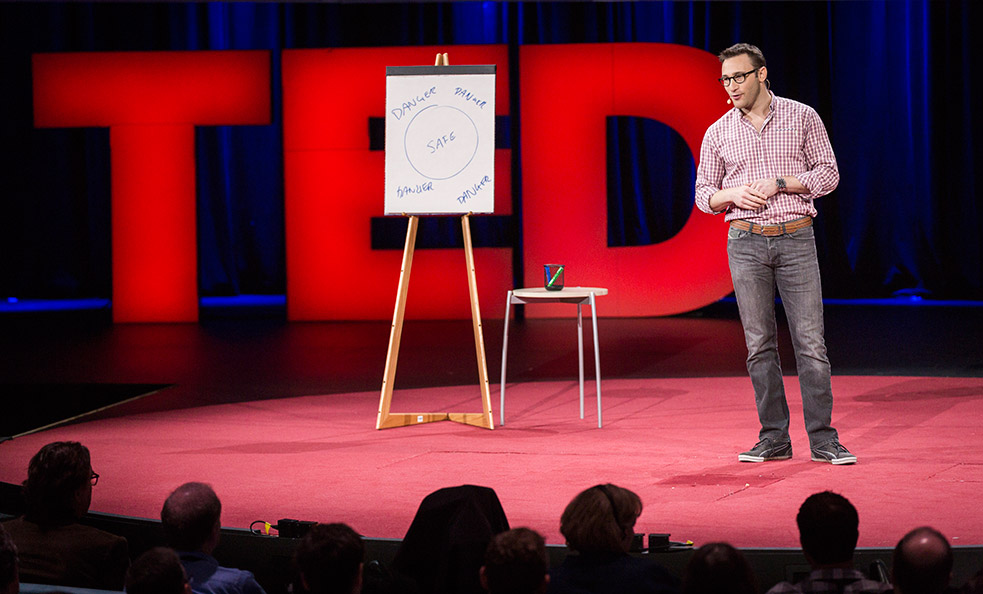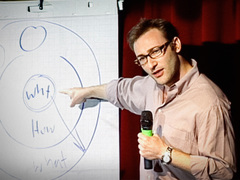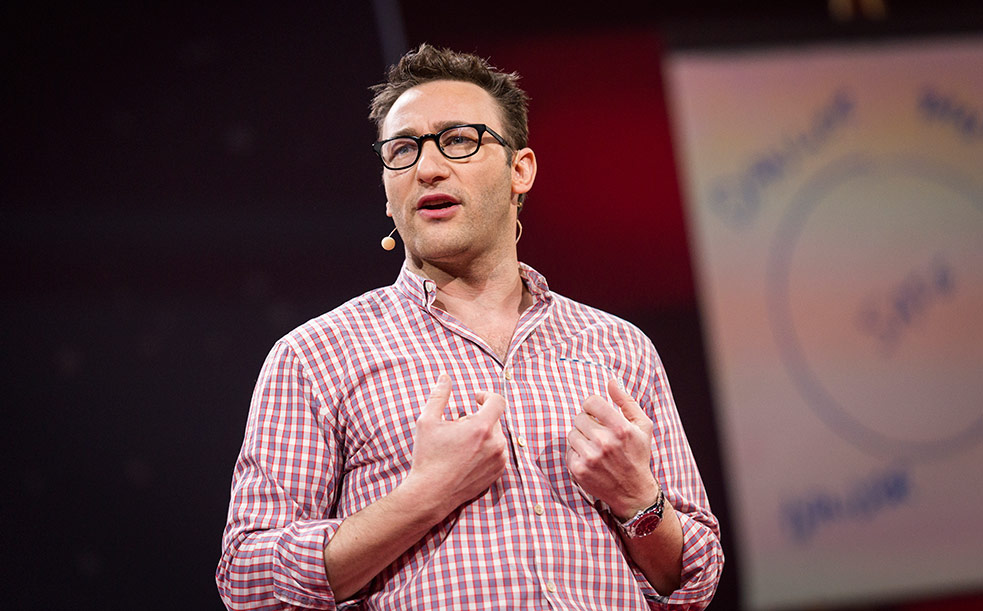
Simon Sinek’s newest idea centers on trust and how great leaders make their people feel inside a “circle of safety.” It’s a topic he got interested in after his TEDx talk blew up. Photo: James Duncan Davidson
In 2009, Simon Sinek gave the talk “How great leaders inspire action” to an audience of 50 people in a small room at TEDxPugetSound. It quickly became the second most-watched talk on TED.com. Sinek, of course, felt honored by the growing popularity of his talk—and by the opportunity to inspire people to think more deeply about the sense of purpose infused in their work. But his talk had an unexpected side effect too.
 Simon Sinek: How great leaders inspire action
“As the view count on my TEDx talk grew, the demand for finding one’s ‘Why’ expanded. That, in turn, created a greater demand for me, and played a significant role in catalyzing my career,” Sinek says now, five years later. “As demand for me grew, I started to meet people who told me things that resonated with me—they’d tell me their ‘Why’. And for that reason I was drawn to them. But some of them didn’t want to be my friends or share my cause. They only wanted something from me. Ultimately, I didn’t know who to trust.”
Simon Sinek: How great leaders inspire action
“As the view count on my TEDx talk grew, the demand for finding one’s ‘Why’ expanded. That, in turn, created a greater demand for me, and played a significant role in catalyzing my career,” Sinek says now, five years later. “As demand for me grew, I started to meet people who told me things that resonated with me—they’d tell me their ‘Why’. And for that reason I was drawn to them. But some of them didn’t want to be my friends or share my cause. They only wanted something from me. Ultimately, I didn’t know who to trust.”
Suddenly, Sinek felt compelled by the questions: how do we know who to trust? And how can communities foster trust as an intrinsic value?
Sinek got the perfect opportunity to think about both questions more deeply while working with the United States military. Observing military personnel, he was impressed by the level of trust and mutual support he saw. “People had to rely on one another to stay alive,” says Sinek. “Meanwhile, in the business world, people don’t give anything away for free, or even credit others.”
In August of 2011, Sinek was invited to visit a base in Afghanistan with the Air Force, to get a better sense of the work that Airmen do. Shortly after landing at the Bagram Airfield, the largest U.S. military base in Afghanistan, the base came under rocket attack. There were three rockets that exploded—one exploded just 100 yards away from the nose of the aircraft he was on. His military companions stayed calm which, to his surprise, helped ease his fears. After a short night of sleep, Sinek and the two officers with whom he was traveling joined a supply airdrop mission, an experience that he calls amazing.
This was supposed to be the end of Sinek’s trip to Afghanistan. But when the three of them got to the airport to catch a flight as standby passengers, they were bumped from their plane because the plane was making more room for stretchers. All other available flights were full. It was a Saturday—and the next flight wasn’t leaving until Tuesday. There was no guarantee they would be able to board a plane that day either. Sinek, feeling out of control of his circumstances, felt paranoia that more rockets would strike and felt convinced that they would land on him.
“I did not want to be in Afghanistan anymore,” Sinek said. “I wanted out.”
With his mind racing, he didn’t know what to do to find a sense of calm again. He realized his symptoms were equivalent to those of someone unhappy at work, but compressed into a 24-hour experience. “When we are unhappy in our jobs, we mistake moments of excitement and happiness for fulfillment, despite the fact that we we don’t want to wake up the next day and do our job all over again,” he says. He felt like he had become one of those selfish bosses—the one more concerned about himself than others.
“With no other option, I mentally and emotionally gave up. I resigned myself to the situation,” he said. “At that point, I realized I might as well make myself useful if I’m stuck here. So I decided to volunteer to help out.” He offered to sweep floors or carry people’s belongings.
At that moment, one of the officers burst back into Sinek’s room and let him know that a flight had been redirected that they could get on. All three of them would be able to leave.
“The reason the flight was redirected was because we would be carrying home a fallen soldier,” Sinek said.
Before take off, the fallen soldier’s fellow troops did a slow eight count salute and walked away. The three of them would be the only passengers in a huge military cargo plane with a single flag-draped casket in the middle.
“For nine and half hours, we flew in silence,” he says. “Whenever I opened my eyes, my gaze landed on the flag-draped casket. It was the greatest honor of my life to bring someone home — someone who knew more service than I ever will.”
From that experience, Sinek formed an idea: that a true sense of purpose comes from the opportunity to serve those who serve others. He noted that it’s not just the people who infuse an environment with a spirit of trust, but that the environment itself plays a role.

Simon Sinek got a great response to his talk at TED2014, and it’s since been viewed more than a million times. Photo: James Duncan Davidson
Trust became the major theme of Sinek’s most recent book, Leaders Eat Last: Why Some Teams Pull Together and Others Don’t. It offers an evolution on his thoughts about leadership. In his original TEDxPugetSound talk and first book, he showed how the best leaders are able to articulate the ‘Why’ of what they do. In his new book, he looked at how the best leaders inspire trust in their employees and make them feel safe.
After Sinek’s TEDx talk went viral in 2009, he had gotten to know TED Content Director Kelly Stoetzel. About a month after an interview published in Inc Magazine about his newer work at the time, the two met for lunch. While catching up, Sinek’s thoughts about his research on trust came up.
“At the restaurant, I asked Simon what he was thinking about these days, and his answers completely captivated me,” Stoetzel says. “He is very sharp and thinks quickly. The way he talks is so clear and articulate. His response felt like a fully formed TED talk.”
After the lunch, Stoetzel told the rest of her curation team about the conversations she had with Sinek. Shortly afterwards, they invited him to speak at TED2014 in a session called “Unstress.”
Sinek’s new talk centered on his concept of the “circle of safety,” and how leaders can create an environment that promotes trust among employees.
“The closest analogy I can give to what a great leader is—it’s like being a parent,” Sinek said on the TED2014 stage. “If you think about what being a great parent is, what do you want? We want to give our child opportunities, education, discipline them when necessary, all so that they can grow up and achieve more than we could for ourselves. Great leaders want exactly the same thing. They want to provide their people opportunity, education, discipline when necessary, build their self-confidence, give them the opportunity to try and fail, all so that they could achieve more than we could ever imagine for ourselves.”
 Simon Sinek: Why good leaders make you feel safe
Since being posted in mid-May, Sinek’s new TED Talk, “Why good leaders make you feel safe,” has been viewed more than 1.6 million times. Meanwhile, five years later, his TEDxPugetSound talk has been watched more than 17 million times. In a way, both talks came about because of the trust Sinek inspired in a co-worker. Alison Whitmire, who organized TEDxPugetSound, asked Sinek to speak after hearing about him from a fellow business strategist. “I met a woman who had worked with Simon in the past. I loved what she did, so I asked her to speak. She said, ‘No, you want Simon.’ She connected us. And it was the breakout talk of the conference.”
Simon Sinek: Why good leaders make you feel safe
Since being posted in mid-May, Sinek’s new TED Talk, “Why good leaders make you feel safe,” has been viewed more than 1.6 million times. Meanwhile, five years later, his TEDxPugetSound talk has been watched more than 17 million times. In a way, both talks came about because of the trust Sinek inspired in a co-worker. Alison Whitmire, who organized TEDxPugetSound, asked Sinek to speak after hearing about him from a fellow business strategist. “I met a woman who had worked with Simon in the past. I loved what she did, so I asked her to speak. She said, ‘No, you want Simon.’ She connected us. And it was the breakout talk of the conference.”
In his work today, Sinek continues to seek out environments where there are strong circles of safety, and opportunities to build them. Time and again, he finds that the leaders who get the most out of their people are the leaders who care most about their people, too.
Comments (13)